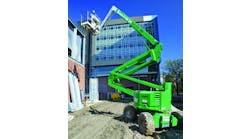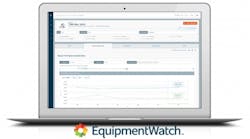Rental companies learned some painful lessons the past few years. They'll need to remember them in the challenging times ahead.
After several painful years in the rental industry, 2011 was a welcome return to improved business, according to most rental companies, although growth coming from a low starting point did not make for a record-setting year. Still, an upward trend obviously beats a downhill slide.
Before getting caught up in euphoria over a more positive economic environment, with relatively upbeat expectations for 2012, there are a lot of reasons to pause and reflect about lessons learned from the past recession. These lessons need to be considered for a number of reasons, but primarily two dynamics dominate.
If the industry was on the verge of a boom-type growth period, a reflection on what lessons were learned in the past recession would be vital so that rental companies would avoid making mistakes that led them into trouble a few years ago. However, such a boom is not likely, and storm clouds remain on the economic horizon. And while most economists have backed off predictions of a “double-dip” recession, there are causes for concern and some in the rental industry feel the recession has never really ended for all practical purposes.
Although most rental executives interviewed say they are focusing on what they can control — their businesses — rather than on international concerns they can't control, a variety of issues are on the minds of rental people. The potential fallout from the European debt crisis; long lead times on equipment orders; the rising of equipment costs because of Tier 4 engines; component shortages and delays; costs of metals and other resources such as engines, tires, oil and steel; medical costs; lack of availability of mechanics; continued weakness in the housing market; governmental issues (mostly budget) on state and national levels; potential inflation; the results of the next national election; stubbornly stagnant rental rates and general lack of customer demand are all issues that cause concern.
Paying close attention to the balance sheet is the primary lesson stated by most rental people coming out of the downturn. “Balance sheet is important all the time,” says David Griffith of Modern Group. “Asset management is critical. Hard decisions need to be made early. Over communicate with customers, vendors and employees.”
Graham Hood, CEO of Neff Rentals also strongly emphasizes reacting as quickly as possible. “When you see the signs of a pending downturn, be prepared to take action early, rather than waiting,” he says. “Having a diversified customer base, being well capitalized and having a strong balance sheet will better enable you to weather any down cycles.”
Reacting quickly by reducing fleet is a common theme. “The lesson learned is not to carry too much debt and to quickly move out underperforming equipment in the fleet to manage that debt,” says Wayne Wadley, 4-Way Equipment Rentals, Edmonton, Alberta, Canada.
Fleet reduction was an almost universally practiced method of surviving the recession, from the smallest rental companies to the biggest. Rental companies aged their fleets and walked the delicate balancing line between aging the fleet and adding maintenance costs.
“Don't buy too much equipment and take on too much debt too quickly,” adds Joel Theros, Theros Equipment Rentals. “Age your fleet appropriately and keep the discipline in place in your operation to properly service and maintain the equipment through its useful life.”
“We learned certainly a better meaning of lean operations, while not taking the customer service out of focus,” says Brendan Horgan, CEO of Sunbelt Rentals. “In an asset-intensive business like we're in, from a practical standpoint, running a business such as this you always have to keep in mind your leverage and your debt. I think to those that have survived and fared well that was a key difference-maker.”
As much as rental companies emphasize adaptability, they also cite the importance of sticking to well-managed practices and focusing on what works well for the customer. “Always keep your composure and make the healthiest choices even if the outcomes are temporarily disappointing,” says Joe McCaffrey, business development manager, Able Equipment Rentals.
“We learned not to trust the banks and other financial institutions to make good decisions or decisions in the best interests of their customers,” says Bill Thompson, president of Thompson Pump. “Their poor decisions can result in serious damage to our businesses. We learned not to trust the government or the politicians to act in a fiscally responsible manner, to maintain effective oversight, or to make good decisions in the best interests of the taxpayers.”
Continue to Page 2
changing landscape
As rental companies digest and hopefully remember the lessons learned from the past recession, they will be participating in a changing industry landscape. As in previous recessions, rental companies were forced by a downturn that surprised most with its length and depths to dramatically enhance efficiencies in every aspect of operation. While most rental companies employed similar strategies to survive this recession, some were already too over-leveraged or reacted too late. It took skill, steering ability and steady nose-to-the-grindstone hard work to survive and those that didn't weren't necessarily lacking in those attributes.
“The industry has certainly evolved and today is a more disciplined industry as well as more advanced in its financial and asset management,” says Neff's Hood. “Going forward, I expect the use of technology to continue to evolve within the industry and play a larger role.”
Many in the rental industry say rental penetration increased during the recession, creating great long-term opportunities for rental companies because of growing preference for the rental option on the part of contractors. Obviously this is good news for rental companies and will have important effects on the industry, forcing higher standards of performance.
“The services offered by most rental companies have become more comprehensive and full-service,” says Theros. “Rental has become the norm for getting equipment to the jobsite as more contractors increasingly choose to rent instead of buy. We are constantly asked to rent things that we have never carried — for instance we just bought our first HEPA filters for rental. We had turned them down too many times.”
“We are seeing our customers be more reliant on rental than they ever have been before,” says Sunbelt Rentals' Horgan. “So we are much more of a partner to a contractor than we are a service provider to a contractor. They are looking for breadth of product. More so than ever they are looking for consistency in service and for ease of doing business. Some of our focus is in trying to accommodate that and I think that is a change. Customers are looking for partners that have breadth, creativity and flexibility.”
Higher expectations expand rental companies' possibilities and vision of their business and will force them to expand their capabilities. “There are broader rental opportunities than those that we own in our fleet today,” adds Horgan.
The partnership aspect means a deeper level of collaboration. “We get a better feel for our customers' bookings and backlogs than we ever have,” Horgan says. “[For example], in our scaffolding business, here we are designing the scaffolding anywhere from a power plant boiler to a refinery project to a state capitol building. And when you do that, you have longer lead times, and you are more of a partner or subcontractor than just a rental provider. We're seeing more of that.”
Lack of access to capital in uncertain economic times has influenced rental penetration as well. “I expect the lack of credit availability from the banks and the ongoing uncertainty in construction will drive even more contractors towards adopting the rental model,” says Dave Smith, president of North American operations for Snorkel.
Typically in recessionary times contractors are more inclined to rent rather than risk capital expenditures on equipment with limited utilization, but current trends suggest more of a long-term shift.
“As credit markets tightened, end users were compelled to look for alternatives to simply acquiring needed capital equipment, rental provided the solution,” says Mike Riotte, rental coordinator, Illinois Truck & Equipment. “I believe the increase in longer term rentals are authentication of this view. My expectation is that many companies who now have experienced firsthand the benefits of renting may continue to rent versus own.”
As more contractors discover a comfort level with rental, they are demanding higher standards from rental companies and are increasingly seeking single-call, sole-source arrangements with rental companies to simplify the process of doing business. While larger players can facilitate those types of relationships more easily because of size of fleet and inventory, small rental companies can use alliances to help respond to customer needs.
“Our customers have articulated that they are looking for more single sourcing of products and services,” says Canada's Wadley. “We are building strategic alliances with portable toilet, fencing and scaffolding companies, for example, for items that we currently don't supply or want to supply. I see that strategy becoming broader within the industry in the future.” Wadley adds that larger national players are likely to partner with smaller companies to provide types of equipment they don't typically carry, opening up some strong opportunities for smaller independents.
A similar but opposite trend finds some rental companies opting to specialize more and be less general. “We may see rental companies change from ‘general rentals’ to ‘specialty rentals,’” says Harry Schneider, president, Allied Financial Solutions. “We have already seen some rental companies change the look of their business. Some have sold off their construction equipment and concentrate on party rentals only and we have also seen other companies sell off their party rental side and concentrate on small contractor and homeowner rentals. Those trends may well continue. Rental owners are definitely going to take a close look at their most profitable rental products and determine how to build off such products, adding products that are closely associated with such products.”
“We continue to see the growth of specialized rental segments, such as party, aerial, pump and power and others,” adds Pierre Pereira, vice president of sales and marketing for Billy Goat Industries.
While rental companies are likely to add to fleet in 2012, the rising cost of equipment is another reality being faced. Rental companies will have to be prepared to pay higher prices for equipment because of Tier 4 costs as well as supply chain instability. More long-term planning will be required too. “Manufacturers are producing equipment to order instead of for stock, requiring equipment buyers to plan for purchases long into the future,” says Rick Dahl of Metrolift, Sugar Grove, Ill. “These trends will continue for the foreseeable future.”
While higher prices on equipment are an inhibitor for rental companies seeking to add to their fleet, they also make it harder for contractors to purchase, another factor in favor of rental penetration.
Environmental concerns will continue to matter in the rental industry, and rental companies will need to be aware of concerns their customers have as well as take advantage of opportunities that come their way as a result. “Our rental business is solely industrial at Delta Rigging and over the past several years, the movement in energy to alternative fuels and renewables has been a large change,” says Delta Rigging's Piwonka. “We anticipate these changes to continue going forward and they will be a focus and larger portion of our business.”
Continue to Page 3
better times ahead
Rental companies did better in 2011 than in previous years and the majority of them expect 2012 to be a solid year. And while in recent years many held back on needed investments for fleet replacement, development and expansion of sales capabilities and more sophisticated IT systems, they are more likely to spend money in 2012, albeit with a healthy dose of caution. Most rental companies surveyed by RER posted moderate to double-digit growth in 2011, coming off a low point and most expect similar results in 2012.
Rental companies are most likely to invest in fleet, IT enhancements and sales efforts. “We are increasing our sales staff and making ongoing IT investments to gain market share,” says Charles Snyder, CEO of Amquip Crane Rental, although the crane rental market appears more uncertain than the construction equipment rental arena. “We are exploring alternatives relative to expanding our footprint.”
“We'll continue to be vigilant about equipment quality and will make fleet additions,” says John Sotiroff, vice president of sales and distribution for Seattle-based Spider. “We're hiring sales talent and continuing training to drive still-better solutions.”
Theros Equipment's Theros says his company will continue to hire mechanics and support staff, add service trucks, and may make investments in smartphones for outside sales and support staff. “We also continually invest in our branches and the presentation of the operation with new lighting, tile, displays and asphalt to keep the quality image up,” he adds.
Able's McCaffrey says his company will make “major capital expenditures” in 2012. “We will purchase equipment, increasing and diversifying our fleet in 2012, we will expand the footprints of our facilities, we will increase the size of our repair, parts and service business unit and we will continue to expand our trucking and heavy-haul capabilities.”
John Hofmeyer of Patten Rental Services in Chicago says Patten will invest in remodeling two branches, as well as adding equipment, drivers and mechanics. Benno Jurgemeyer of Sunstate Equipment says most of Sunstate's investments will be in rental fleet, but the company will be “picking up the pace with investment in IT systems and training programs.” Dahl says Metrolift will increase spending by 10 percent on fleet, IT and sales staff.
Rental companies are able to be optimistic and confident about investing in 2012 for the primary reason that their customers are expressing optimism, however guardedly. A lot more customers have backlogs on the books than a year ago. Still, however, the optimism is not unanimous.
“Gun-shy might be a good way to describe the attitude of many of our customers,” says Thompson Pump's Thompson, despite a 5- to 6-percent revenue increase in 2011 and the expectation of 5- to 8-percent growth in 2012. “They're hesitant to commit to anything because they feel like they're on a rollercoaster, one that doesn't go very high and one that they hope doesn't go much lower. They're definitely uncertain of the future because of the governmental regulations and restrictions that are threatening them. The delay in the Keystone pipeline project is a perfect example of the reasons for their reticence. Will it proceed or is it dead in the water? Are the hydraulic fracturing operations in jeopardy? Are the nuclear power plant permits going to be issued? Who knows?”
The economic health of the customer plays a role in rental prosperity as well. “Our client base is mixed in their opinions for 2012,” says Able's McCaffrey. “Business activity for most of them is good but their cash flow is still constrained. One of the biggest drags for them is the untenable level of delays over construction payments due them because of change orders implemented by their clients — the construction buyers. In most cases, there is very little dispute that work was performed satisfactorily. But nonetheless, GCs and subs getting paid is a major issue.”
In summary, the overall rental industry mood and outlook is a lot more positive than it was a year ago, with the ever-present realization that potholes could line the road. If so, lessons learned from the last recession will be important and should be tacked on the bulletin boards of every rental company around.









